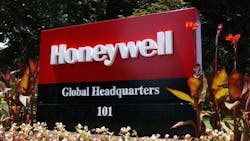Honeywell Blames Business-Jet Slump for Profit Tumble
Honeywell International Inc. tumbled the most in more than a year after citing weaker-than-expected demand for business aircraft and helicopters as a reason for missing a profit forecast and cutting the top end of its 2016 earnings target.
The shares fell 7.6% to $106.87 at 3:03 p.m. in New York, after dropping as much as 9%, the largest intraday decline since August 2015. Honeywell’s slide was the third-sharpest on the Standard & Poor’s 500 Index. The stock had gained 12% for the year through Thursday.
Honeywell’s prediction that the business-jet market will remain weak next year fueled declines at other aerospace manufacturers such as Textron Inc., Bombardier Inc. and General Dynamics Corp., which produce private jets, as well as United Technologies Corp., whose Pratt & Whitney unit makes engines.
Slumps in emerging markets and the oil industry have crimped demand for business aircraft and helicopters, hurting Honeywell’s unit that sells jet engines, cockpit controls and other aerospace parts. Third-quarter aerospace sales dropped 6 percent to about $3.6 billion and the weakness will spill into 2017, Chief Financial Officer Tom Szlosek said in a conference call Friday.
“We believe the conditions will remain the same or moderately worsen before the market starts to recover in 2018 and 2019,” he said.
Oil Prices
Weakness in business-jet demand is spreading to regions such as North America and Europe, Szlosek said. That adds to soft sales in Russia because of economic sanctions; the Middle East, which is suffering from lower oil prices; and “campaigns in China to avoid any semblance of luxury in business travel,” he said.
“We’re also seeing corporate flight departments in developed regions cutting back on equipment, usage and services,” he said.
Honeywell had been seen as a safe-haven stock amid sluggish industrial growth, on the reputation of Dave Cote for turning around the company after becoming chief executive officer in 2002 and for his record of delivering on profit targets, said Nick Heymann, an analyst at William Blair & Co.
Now the Morris Plains, N.J.-based company is struggling to meet existing businesses’ sales targets, which is key to driving profits beyond what can be reaped through cost cuts and efficiency, Heymann said. Honeywell said so-called organic sales will be down as much as 2% this year, missing a target of about 1%, and will be lower than forecast in 2017.
Consistent Performer
“Honeywell was perceived to be one of the most consistent performers with least risk,” Heymann said. “This was a surprise.”
Cote is stepping down as CEO at the end of March and will be replaced by Chief Operating Officer Darius Adamczyk.
The forecast cut was “disappointing,” said Jeff Windau, an analyst at Edward Jones & Co. Still, investors may be overreacting to several changes that Honeywell announced Thursday after the close of regular stock trading.
“Honeywell has been operating very well in a difficult industrial environment,” he said. “While this quarter and maybe next quarter look to be a little bit worse than anticipated, we still believe they’re well positioned long term to benefit from growth opportunities.”
Honeywell’s third-quarter earnings will be about $1.60 a share, according to a company statement Thursday. That fell short of the previous forecast of $1.67 to $1.72. Honeywell lowered the upper end of its 2016 profit target by six cents to $6.64 a share. The company is set to report earnings on Oct. 21.
Corporate Reorganization
Amid the slow growth, Cote has been shaking up his company, selling an aerospace government-services business on Sept. 16 and spinning off a resins unit on Oct. 1. Those two businesses together have annual sales of about $1.3 billion and add 14 cents a share to earnings. The company also split its Automation and Control Solutions operation into two units.
Honeywell said Thursday that it adopted new accounting rules that boosted earnings by 14 cents a share this year through the end of September. The gains from the divestitures and accounting change were applied to cost-cutting programs that will create annual savings of as much as $225 million, the company said.
The savings will help Honeywell target 2017 earnings growth of more than 10%, excluding the divestitures, and an increase in profit margin of as much as 75 percentage points. Honeywell expects sales from existing business to post “low single digit” growth.
About the Author
Bloomberg
Licensed content from Bloomberg, copyright 2016.
